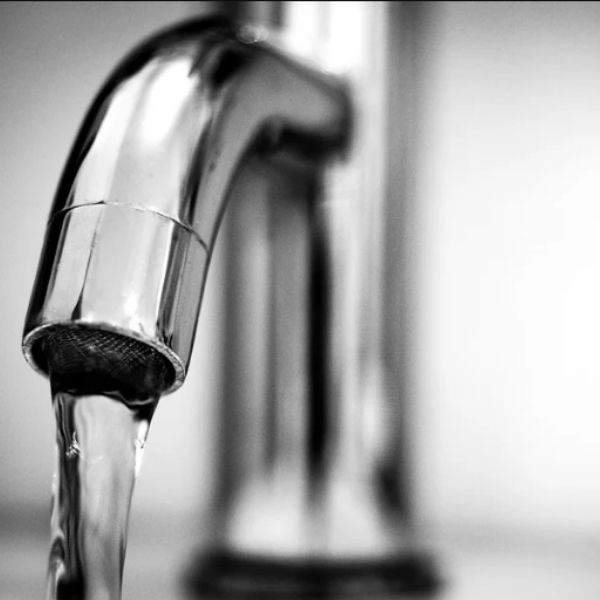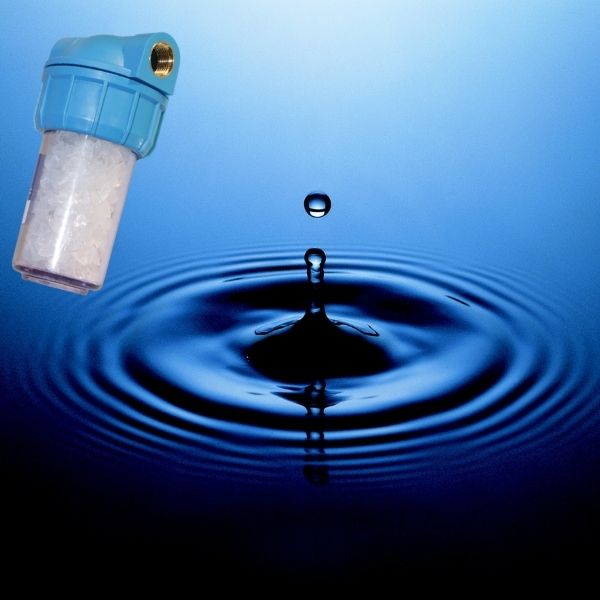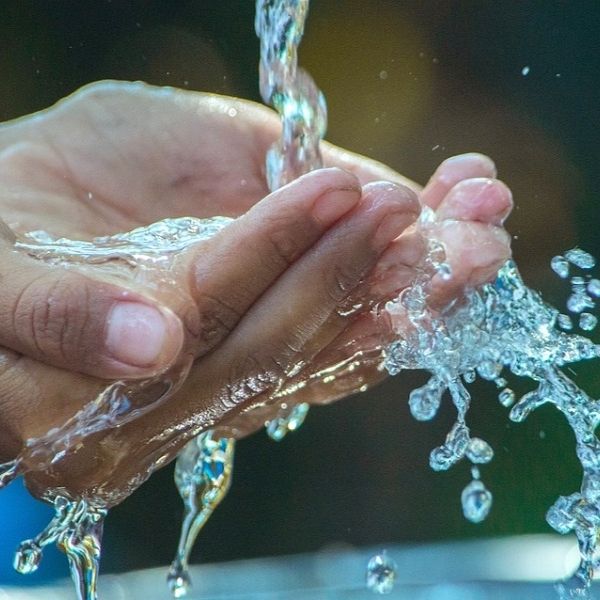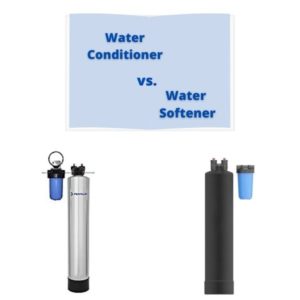Is a Water Softener the Same as Water Conditioner?
It is entirely okay to feel confused by the jargon used around water treatment systems. Both water conditioners and softeners have different purposes of serving.
We know that all you are concerned with is the water quality in your home, so it can be annoying to constantly have to keep up with all these different water treatment systems.
A conditioner works on a technology different than that of a softener. Their core work is what sets them apart from each other.
This is why we draw the upcoming comparison table and then a detailed discussion on understanding the two.
Water Conditioner Vs. Water Softener Comparison
| Features | Water Softener | Water Conditioner |
| Core Technology | Ion exchange process | Template assisted crystallization |
| Softener Features | Completely removes minerals and also results in the production of wastewater. | Will not completely remove minerals. |
| Electricity | Will require electricity. | Does not require electricity. |
| Price Range | $800-$1500 | $1200-$2500 |
| Maintenance | Requires maintenance every 6-8 weeks | Requires maintenance every 6-8 years. |

What Is a Water Softener?
A water softener is also referred to as a salt-based water softener. The primary technology it uses for its working is this process called ion exchange.
Traditional water softeners use salt during their mechanism, which is where the name comes from.
A mineral tank containing a resin bed (of sodium ions) is present within the softener. As the water passes through this part, the process of reverse osmosis takes place.
The magnesium and calcium ions present in the hard water get attracted towards the resin bed. The sodium ions from the resin replace these hardness ions in the water.
As a result, we get this soft water that has almost no amount of calcium and magnesium ions but a higher amount of sodium ions.
You can install a water softener in your home plumbing system to improve the quality of your drinking water or your water supply in general.
A softener entirely removes the hardness-causing minerals, which can be a massive benefit for people who are worried about the problems that hard water may cause them.
Water softener systems remove scale buildup in your pipes and water appliances as well.
In a nutshell, salt-based water softeners are unique from water conditioners because of their distinct qualities, such as the ion exchange process or the production of wastewater.
You do have to maintain the softener quite regularly, like any other water filtration system. You will constantly have to add more salt to the brine tank to keep it up.
What Is a Water Conditioner?
A water conditioner works on this principle of template-assisted crystallization. It has one tank that contains resin beads, and it can be used for treating different water sources.
The process for this might be a little confusing to understand because it is similar to the softening process.
But what happens in a water conditioning system is that the calcium and magnesium minerals from the hard water stick to the resin beads and start growing in size. This ends up turning them into crystals.
Slowly, these hardness minerals loosen from the resin beads and enter the water again, but now they are unable to get dissolved into it. They also cannot affect your pipes now and do not cause any scale buildup.
So contrary to a softener, a water conditioner does not really remove the water hardness minerals, but they do treat them in a way that takes away from a lot of their disadvantages.
Another confusing thing about these water conditioners is that some manufacturers refer to them as “salt-free water softeners.” This might be deceiving to customers if they do not perceptively read the product information.
It is also wrong because the technology in a water softener is not the same as a conditioner, and it does not work without salt. So technically, there is no such thing as a salt-free water softener.
So before buying any product, ensure whether you want a salt-free water conditioner or a salt-based softener.

Which Is Better: Water Conditioner Vs. Water Softener
Looking at all this information might get perplexing for some of you, and that is okay! We are here to help you understand which one is the better product for you: a salt-based water softener or a salt-free softener.
We evaluate this comparison through four different factors, at the end of which you will be able to understand better which is the right product for you.
Price
The price is perhaps one of the most critical factors of considering any purchase and also often the part where people get scammed the most.
Sellers will try to get hefty amounts of money out of you by listing the soft water benefits or claiming that their product will provide you with the highest water quality possible.
It is impossible not to fall for these tactics and always do your own research.
You have a wide range of prices for both water softeners as well as water conditioners. But you can usually find much cheaper conditioners, but softeners start from hundreds of bucks.
A water softener is also more expensive in the long run because it requires a lot more maintenance than a water conditioner. This is one of the most important parts to focus on because a short-term cost is not the only one you pay with these appliances.
Water Quality
The quality part is a little essential to understand closely. On the surface level, it might seem that both water softeners and conditioners do the same thing: making water cleaner. But that’s not really accurate.
Here’s the thing: A water softener removes water hardness by separating these mineral ions that are responsible for it. It is not a water filter for tap water; instead, it only removes the hardness.
On the other hand, a water conditioner does act as a water filter, and it can precipitate water hardness by turning the calcium and magnesium ions into crystals. They do not get removed from the water; their form just gets changed.
If removing water hardness is your only concern, then a softener is the best water treatment system for you.
But if you want to improve the quality of your cooking and drinking water, then water conditioners are the way to go for you. They significantly improve your tap water by removing harmful contaminants.
Maintenance
We have already discussed that water conditioners are cheaper in the long run because they do not require constant maintenance. But why is this so?
Water conditioner systems rely on the water pressure for their working. They do not utilize any electricity, so this saves you on energy bills. Hence, a water conditioner also has less running costs.
The maintenance price is also low because all you need to do is change the water filters; how often you need to do that depends on how much you utilize it and in what capacity. But beyond this occasional filter change, there is nothing else required.
The ion exchange inside a water softener requires electricity. If your water softeners run a lot, it can significantly impact your water bills.
You also need to run a maintenance check on water softeners once every few months. The salt in the resin needs to be replenished. Because of the frequent salt usage in the water softening system, the cartridges also need to be replaced.
Water softening can also waste a lot of water during the process, and the waste it produces often affects the water supply in your surroundings.
This is the reason that certain areas such as California ban the use of salt-based water softeners. So, in places like this, you are very limited with the appliances that you can use.
Your personal requirement
The reason behind mentioning all these factors is not to discourage you from buying a water softener. Even though we discuss all these other factors, after one point, this discussion becomes futile because the core purpose of water conditioners is different from water softeners.
It is essential to understand your required water treatment system before you decide on what you will get.
If your requirement is to soften water, there will be no use in buying a water conditioner (despite its advantages over a softener) because it is not going to soften water for you.
So, all of these factors can be important at the end of the day, but the most important one is your need.

Which System Should You Choose?
Both these systems have their own benefits and unique features. This is why we will mention their individual features in the upcoming lists so you can use them as a brief guide to understanding which product suits your needs more.
Water Softener
- Turns hard water into soft water by removing the mineral ions
- Adds salt to the water
- Requires electricity
- Requires a drainage line
- Requires constant maintenance of the cartridge
- You need to add salt to the system regularly
Water Conditioner
- Removes chemicals dissolved in the water like chloramines, chlorine, Volatile Organic Compounds (VOCs), etc.
- Does not require electricity
- Does not require a drainage line
- Does not add salt to the water
- Some water conditioners do change hard particles like calcium and magnesium in a way that they do not cause scale build-up anymore.
The other important consideration is whether the area you live in has restrictions on using a water softener. This is because the wastewater from a softener has a lot of salt in it, which a lot of waste facilities do not treat.
This can really impact how and where that water can be reused, so certain areas ban water softeners altogether.
If you live in such an area and still require softened water, you will have to look at other treatment systems to see if any of them fits you.
Wrap-up
This article discussed water softeners and conditioners in complete detail to see which one is better for which purpose. The gist is that they are both different in their core working and are utilized for different tasks.
Hence, do your own research to ensure which product will be the most effective one for your home.
